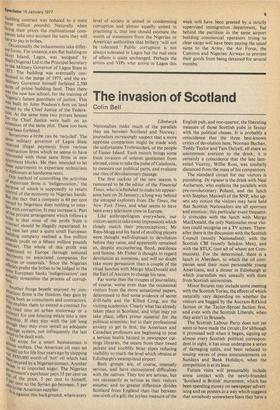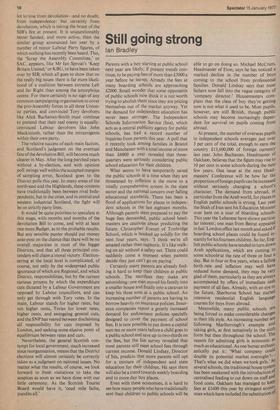The invasion of Scotland
Colin Bell
Edinburgh Nationalists make much of the parallels they see between Scotland and Norway; journalists increasingly suspect that a more apposite comparison might be made with the unfortunate Trobrianders, or the people of Easter Island. Each month brings some fresh invasion of solemn gentlemen from abroad, come to take the pulse of Caledonia, to measure our political parts, and evaluate our rites of devolutionary passage.
The first cuckoo of the new season is rumoured to be the editor of the Financial Times, who is scheduled to make his appearance here on 26 January; a long way behind the intrepid explorers from The Times, the New York Times, and what seems to have been every television crew in Europe.
Like anthropologists everywhere, our visitors seem to take away impressions which closely match their preconceptions; Mr Rees-Mogg and his band of strolling players were thought well-disposed to devolution before they came, and apparently remained so, despite encountering flood, pestilence and famine. Mr Fisher is thought to regard devolution as nonsense, and will no doubt take more persuasion than a couple of the ritual lunches with Margo MacDonald and the Earl of Ancram to change his tune.
Far worse than the troupes of journalists, of course, worse even than the occasional visitors from the more sensational papers, determined to find some evidence of secret drill-halls and the Killed Cong, are the visiting academics. Clearly what has already taken place in Scotland, and what may yet take place, offers prime material for the political scientists; but in their professional anxiety to get in first, the American and Canadian professors are beginning to pose a serious health hazard in newspaper cuttings libraries, the steam from their tweed jackets and knobbly briar pipes reducing visibility to much the level which obtains at Edinburgh's swamp-land airport.
Both groups are, of course, intensely serious, and have encountered difficulties with the natives. They too are serious, but not necessarily as serious as their visitors assume; and no greater difference divides Scotland from England than that between one-sixth of a gill, the joyless measure of the English pub, and one-quarter, the liberating measure of those Scottish pubs in favour with the political classes. It is probably a coincidence that the three best-known critics of devolution here, Norman Buchan, Teddy Taylor and Tam Dalyell, all share an uncommon aversion to the drink ; it is certainly a coincidence that the late lamented Viceroy, Willie Ross, was similarly distanced from the mass of his compatriots.
The standard circuit for our visitors is punishing. De rigueur is the drink with Neal Ascherson, who explains the parallels with pre-revolutionary Poland, and the lunch with Stephen Maxwell of the SNP, who upsets any notion the visitors may have held that Scottish Nationalists are all sporrans and emotion; this particular event frequently coincides with the lunch with Margo MacDonald, the only Nationalist most visitors could recognise on a TV screen. Thereafter there is the discussion with the Scottish Council (mostly Nationalists); with the Scottish CBI (mostly Selsdon Men), and with the STUC (not all of whom are Communists). For the determined, there is a lunch in Aberdeen, to which the oil companies send their most personable young Americans, and a dinner in Edinburgh at which journalists mix uneasily with dons from Scottish universities.
Minor fixtures may include some meeting with the Scottish Tories, the effects of which naturally vary depending on whether the visitors are bagged by the Ancram-Rif kind faction or the Taylor-Sproat faction first, and even with the Scottish Liberals, when they aren't in Brussels.
The Scottish Labour Party does not yet seem to have made the circuit; for although it promised well when it began, signing up almost every Scottish political correspon dent in sight, it has since undergone a series of damaging splits, and been reduced to issuing waves of press announcements on Sundays and Bank Holidays, when the competition is at its least.
Future visits will presumably include some contact with the newly-founded 'Scotland is British' movement, which has been spending money on newspaper advertising and on posters in a way which suggests that somebody somewhere fears they have a
lot to lose from devolution—and no doubt, from independence: but certainly from devolution, which is taking the brunt of the SIB's fire at present. It is unquestionably better funded, and more active, than the similar group announced last year by a number of minor Labour Party figures, of which nothing has recently been heard. This, the 'Scrap the Assembly Committee,' or SAC, appears, like Mr Ian Sproat's 'Keep Britain United,' or KBU, to have been taken over by SIB, which all goes to show that on the really big issues there is far more likelihood of a coalition between extreme Left and far Right than among the amorphous centre. For there certainly is no sign of any common campaigning organisation to cover the pro-Assembly forces in all three Unionist parties, and convinced Tory devolvers like Alick Buchanan-Smith must continue to pretend that their real enemy is equallyconvinced Labour devolvers like John Mackintosh, rather than the intransigents within their own party.
The relative success of each main faction, and Scotland's judgment on the eventual fate of the devolution Bill, will become much clearer in May. After the long parched years without a by-election, and with opinion poll swings well within the accepted margins of sampling error, Scotland goes to the District polls this year. In many areas of the north-east and the Highlands, these contests have traditionally been between rival Independents, but in the cities, and in central and western industrial Scotland, the fight will be on strictly party lines.
It would be quite pointless to speculate at this stage, with months and months of the devolution Bill to come, and with at least one more Budget, as to the probable results. But any sensible punter should put money ante-post on the chance that there will be no overall majorities in most of the bigger Districts, and that all three principal contenders will claim amoral victory. Electioneering at the local level is complicated, of course, not only by the widespread public ignorance of which are Regional, and which District, responsibilities, but by the current curious process by which the expenditure cuts dictated by a Labour Government are opposed by Labour councillors, and can only get through with Tory votes. In the main, Labour stands for higher rates, but not higher rents, Tories for lower rates, higher rents, and swingeing general cuts, and the SNP has veered between disclaiming all responsibility for cuts imposed by London, and seeking some elusive point of equilibrium between rates and cuts.
Nevertheless, the general Scottish contempt for local government, much increased since reorganisation, means that the District elections will almost certainly be correctly taken as a judgment on national issues. No matter what the results, of course, we look forward to fresh visitations to take the auspices as soon as we have done with our little ceremony. As the Scottish Tourist Board would have it, `ceud mile failte, pundits all,'



































 Previous page
Previous page